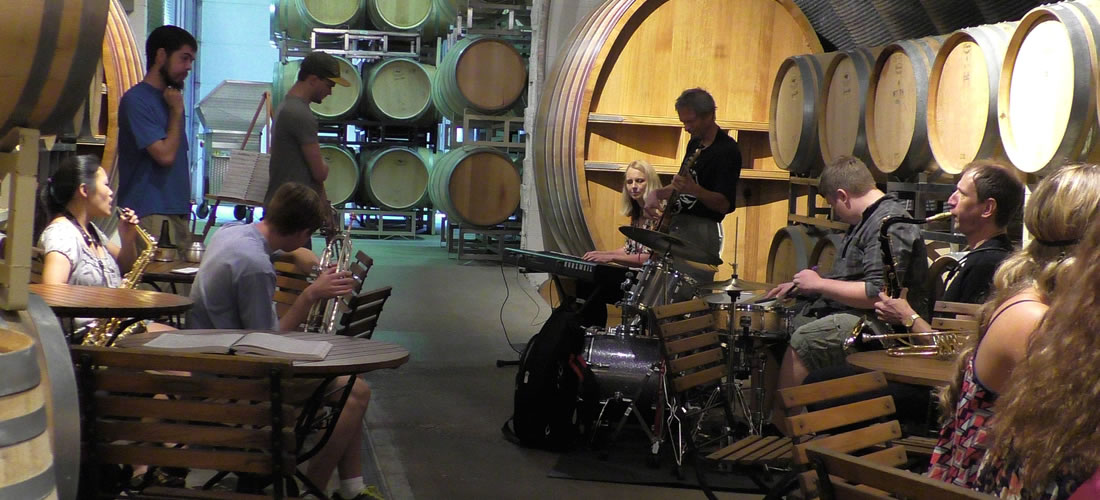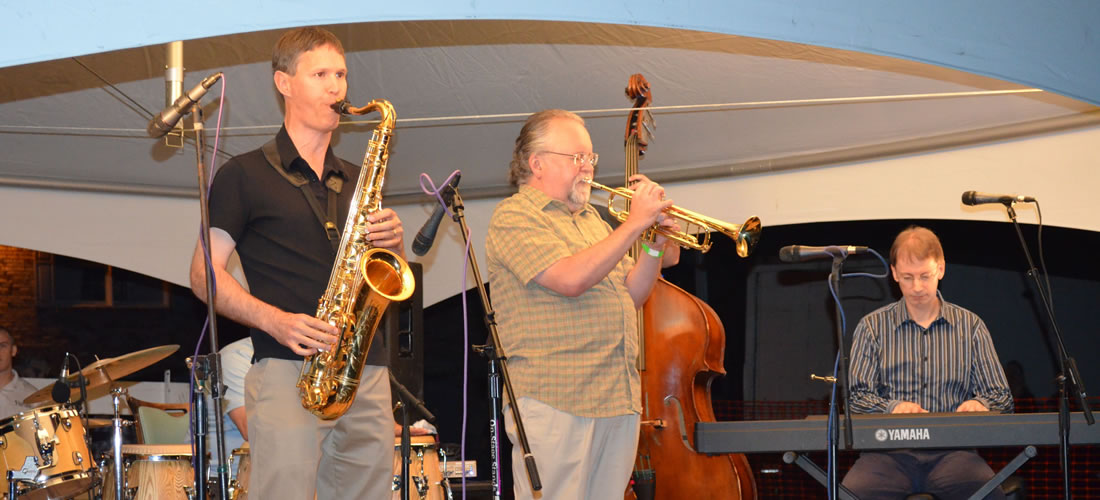 Jackson Creek Middle School band director Joseph Donnelly, this year’s B’town Jazz Al Cobine Award winner, reached into the heart of Bloomington’s past with his recent student production of “Wash Board Blues,” a musical about Hoagy Carmichael.
Jackson Creek Middle School band director Joseph Donnelly, this year’s B’town Jazz Al Cobine Award winner, reached into the heart of Bloomington’s past with his recent student production of “Wash Board Blues,” a musical about Hoagy Carmichael.
Nothing could honor the rich musical legacy of Al Cobine better than a show about Hoagy, performed by 60 of Donnelly’s middle-school jazz musicians and singers. Donnelly’s original music and lyrics, telling the remarkable story of Carmichael, made Bloomington’s Indiana Avenue historical marker to Hoagy “come alive.”
“The success of the Carmichael show probably is the key reason I was honored with the Cobine Award,” says Donnelly.
A graduate of New Trier High School in Chicago, Donnelly studied music education at IU in the late 1980s, where he took courses with legendary jazz professor David Baker and saxophonist Eugene Rousseau. He left IU in 1990 to tour with rock bands before going back to Chicago to study at the VanderCook College of Music, where he earned a bachelor’s degree in music education in 1994.
Donnelly then returned to Indiana where he taught music in public schools in Indianapolis and Columbus. In 2012 he got a master’s degree at VanderCook College of Music and became band director at Jackson Creek Middle School in Bloomington.
At Jackson Creek School, Joe Donnelly teaches big-band jazz, the advanced concert band, several jazz combos, and courses in exploring music and video production. Under his leadership, student interest in music has increased dramatically, with 120 enrolled in band in the fall – almost double that of his first year.
BtownJazz annually gives the Al Cobine Award for “distinguished service to the jazz community of southern Indiana.” Joe Donnelly’s students at Jackson Creek School will surely smile in approval when they see the 2019 Cobine Award plaque in his office.
Cleve Wilhoit, Jr.

In July of 2017, I had the privilege of working at the Jamey Aebersold Summer Jazz Workshops. I was a staff member, and my main responsibilities included taping evening performances by the jazz faculty, unlocking rooms for campers, and filling in as a drummer where necessary in various groups and ensembles.
Jam Sessions
Every night following the evening faculty concerts, jam sessions were held for students. There was one led by a faculty member, and the rest were up to students to organize with their peers. I was able to float around to several different jam sessions and listen, and observed many different skill levels. In every room, there was always someone taking the role of the leader.
The leader role is usually a very tricky one to navigate. Especially in the jazz jam session scenario, the leader needs to be less of a teacher– and more of a director of traffic. Jazz musicians are constantly stepping out of their comfort zones when they perform; the music is totally improvisational. They need to feel that they are in a safe environment where they are free to create without the criticism of others.
Here’s a scenario that I have witnessed many times at jam sessions with two very different resolutions.
Example: A student is soloing over a song they are not too familiar with. The chords are moving by at a very fast pace, and their playing sounds uncomfortable and frantic throughout their entire solo. The last section of their solo comes around, and they are very obviously lost and don’t know where the rest of the band is.
- The leader (who is a very accomplished jazz musician and respected by everyone in the room) loudly solos over the student to demonstrate where they are supposed to be. The leader, wide-eyed, glares at the confused student as he is musically interrupting him. The student packs up his instrument and leaves in the middle of the next person’s solo.
- The leader (who is a very accomplished jazz musician and respected by everyone in the room) from across the room subtly gestures towards the struggling soloist indicating that he has just arrived at the last section of his solo. The student finds his place, and takes another chorus of solo (he is now more comfortable with keeping his place in the song).
The student in resolution A will probably not return to that jam session. He will most likely be incredibly upset and discouraged, and confused as to why the leader was so rude and handled it like he did. The student in resolution B will likely thank the leader at the end for his help, and be more inclined to return because he was not humiliated.
Checking Ego At The Door
Confidence and ego are two very different things that are often confused. Confidence is utmost comfort with your playing and ability, and feeling that you have nothing to prove to any other musicians (they will accept your playing as it is). Ego is utmost discomfort with your perception of what others think about your playing. Ego often drives the musician to play their most complicated, fast, and impressive musical ideas right off the bat. This egocentric musician will often look around the room of musicians checking for reactions. This musician feeds on the approval of others, and is playing the music not for their own musical fulfillment but to impress others seeking a faux type of confidence.
Until a musician can play music that is fulfilling to them, they will always seek the approval of others. It is important to understand that music that someone makes is unique to them and only them, and that is something to be proud of.
Everyone Is A Beginner
While at the workshops, I heard a member of the drum faculty say something to a masterclass that was incredibly humble and encouraging. This faculty member is an accomplished professional musician and recording artist who now has a teaching position at one of if not the best collegiate jazz programs in the world.
“Everyone is a beginner. Whether you’ve just picked up your first pair of drum sticks or you’ve just received tenure from an esteemed jazz program, you’re a beginner. Some of us are just advanced beginners.”





